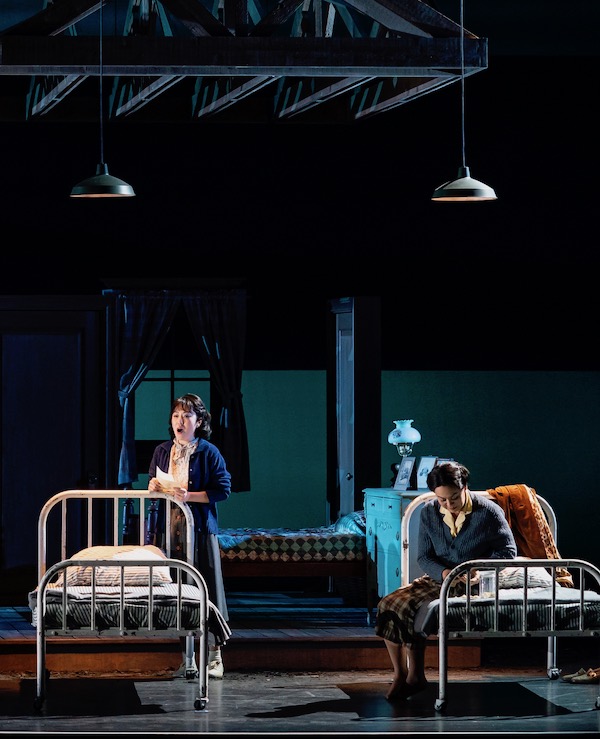Lyric Unlimited presents heartfelt human drama with “An American Dream”

Nothing changes. Not in an America where the bigotry, racism, nativism and anti-Semitism that provide a basis for composer Jack Perla and librettist Jessica Murphy Moo’s An American Dream remain as real as they were when the nation was at war with Germany and Japan. American presidents still are issuing executive orders that effectively strip immigrants and asylum-seekers of basic human and civil rights. The historical circumstances may be different but the underlying issues remain.
Perla and Murphy Moo get that, but that’s not what makes their 75-minute chamber opera so moving and heartfelt a human drama. Set against the backdrop of the Holocaust and the human toll of America’s incarceration of more than 120,000 citizens of Japanese descent following the bombing of Pearl Harbor, An American Dream derives its quiet power from the canny way in which the lives of two fictional women – one a Japanese American, the other a German Jew – coalesce around a common theme: the longing for home.
Commissioned by Seattle Opera and presented there in 2015 and 2017, the reality-based stage work received a potent local premiere Friday night at the Harris Theater, courtesy of Lyric Unlimited. An American Dream is the latest in a series of socially aware, small-scale contemporary English-language operatic presentations Lyric Opera’s community-partnership arm has presented. It follows last season’s local premiere of the splendid Fellow Travelers, and Charlie Parker’s YARDBIRD in 2017. A second performance of An American Dream is set for Sunday afternoon.
Perla and Murphy Moo loosely based their story line on the recollections of two refugees living in the U.S. during World War II, part of an oral history collaboration between Seattle Opera and that city’s Museum of History and Industry. The German Jewish Eva anxiously awaits a letter from her parents, trapped in Nazi Germany with scant chance of escape. Unbeknownst to Eva, her American husband, the Army veteran Jim Crowley, has displaced the teenaged Setsuko Kobayashi and her parents from their house on an island in Puget Sound, wresting the farm from them at a fraction of its value. Forced to leave everything behind, Setsuko’s mother Hiroko and father Makoto become victims of the relocation of Japanese-American citizens to internment camps, per an executive order signed by Pres. Franklin Roosevelt.
Young Setsuko’s prized Hinamatsuri doll, hidden in the floorboards of the farmhouse, and a letter sent to Eva from a friend of her parents informing her of the death of her parents at the hands of the Nazis, bring the women together at war’s end. Eva presents Setsuko with the doll and Setsuko confronts Jim about the coerced sale of her family’s property. Radio reports of Germany’s surrender, the bombing of Hiroshima and the surrender of Japan punctuate the swift stage action as the opera reaches its denouement.
For stage director Matthew Ozawa, the piece is personal. We learn from his program note that his father was born in one of the American concentration camps to which his family was removed during the war. By the time he was born, much of his family’s culture, language and religious practice had been erased because of the incarceration.
Ozawa staged the opera in sure, fluid theatrical strokes, within the spare, quasi-stylized unit set of Andew Boyce, evocatively lighted by Lee Fiskness. Izumi Inaba was responsible for the period-perfect costumes.
That said, the five principals are somewhat sketchily drawn, the drama driven more by circumstance and coincidence than character. But this in no way is to impugn the allure and storytelling effectiveness of Perla’s well-crafted, conservatively tonal score. (This critic also admired his music for the opera Shalimar the Clown, a powerful adaptation of the Salman Rushdie novel, commissioned and premiered by the Opera Theatre of St. Louis in 2016.)
From the sprays of harp, piano and strings that evoked the natural beauty of Puget Sound in the orchestral prelude, the 15-member orchestra under the confident shaping hand of conductor Daniela Candillari supported the five singers with atmospheric splashes of color. Perla’s music is influenced by, but not overly beholden to, Debussy and the motoric rhythms of minimalism, are laced with delicate fragments of pentatonic melody for the Kobayashis. The vocal writing is at all times grateful for the singers, avoiding the gray parlando style that sinks so many contemporary American operas.
Mezzo-soprano Nina Yoshida Nelsen, who created the role of the mother, Hiroko, in the original production, has reprised the part in every subsequent production, including this one. She was deeply poignant – understandably so, since she was, in essence, portraying her own great-grandmother, as the singer has said in an interview. Perla gave the character a powerful scena in which the fatally ill mother laments that her aged hands can no longer hold on to “the dream.”
Even so, it is the role of Setsuko that is pivotal to the opera, and the radiant South Korean soprano So Young Park made the character an affecting presence in the drama, girlish and sentimental at the beginning, resolute in her climactic confrontation with Jim – “Don’t you recognize me?” she declaimed, in mounting anger.
But there were no weak links whatsoever in the rest of the ensemble cast, which included mezzo Catherine Martin, supple of voice, clear of diction and sympathetic of manner as Eva; the fine baritone Christopher Magiera as the war-hardened opportunist Jim; and the sturdy bass Ao Li as Setsuko’s stoic father, Makoto.
An American Dream will be repeated 2 p.m. Sunday at the Harris Theater for Music and Dance, 205 E. Randolph St.; lyricopera.org; 312-827-5600.
Posted in Performances


Posted Mar 19, 2019 at 7:58 am by L K THOMSEN
I’m so pleased I was able to attend this Opera performance. It was penetrating and very meaningful.